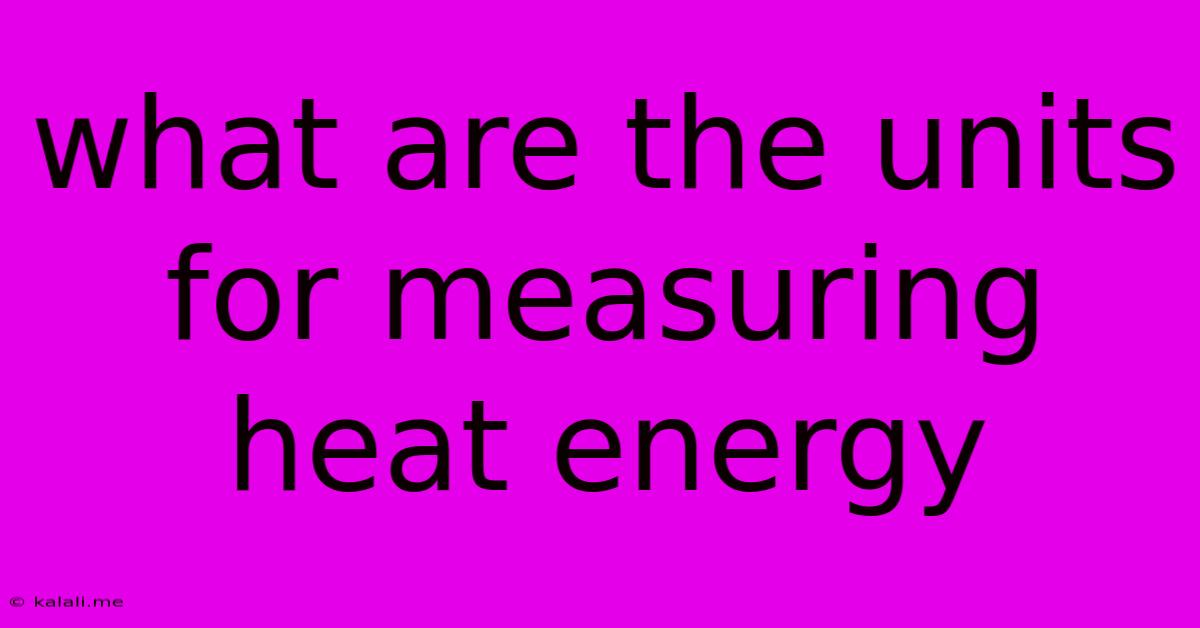What Are The Units For Measuring Heat Energy
Kalali
Jun 15, 2025 · 3 min read

Table of Contents
What Are the Units for Measuring Heat Energy? A Comprehensive Guide
Heat energy, a form of energy that transfers from a hotter object to a colder one, is a crucial concept in physics and engineering. Understanding how we measure this energy is essential for various applications, from designing efficient heating systems to understanding climate change. This article explores the different units used to quantify heat energy, their relationships, and common applications. The key takeaway is that understanding these units is vital for accurate calculations and interpreting scientific data related to heat transfer and thermodynamics.
The Joule (J): The SI Unit of Energy
The joule (J) is the standard international (SI) unit for measuring all forms of energy, including heat. One joule is defined as the work done when a force of one newton is applied over a distance of one meter. In the context of heat, a joule represents the amount of heat energy transferred. It's a versatile unit used across numerous scientific disciplines.
The Calorie (cal) and Kilocalorie (kcal): Older Units Still in Use
The calorie (cal) is an older unit of energy, historically defined as the amount of heat required to raise the temperature of one gram of water by one degree Celsius. However, this definition is imprecise due to the variations in water's specific heat capacity with temperature. A more precise definition uses the joule: 1 calorie = 4.184 joules.
The kilocalorie (kcal), often referred to as a "Calorie" (with a capital C) in nutrition, is equal to 1000 calories. This is the unit commonly used to measure the energy content of food.
The British Thermal Unit (BTU): A Unit Used in Specific Industries
The British thermal unit (BTU) is another unit of energy commonly used in the United States and some other countries, particularly in the heating, ventilation, and air conditioning (HVAC) industry. One BTU is defined as the amount of heat required to raise the temperature of one pound of water by one degree Fahrenheit. The conversion to joules is approximately: 1 BTU ≈ 1055 joules.
Comparing the Units: A Quick Reference Table
| Unit | Symbol | Definition | Relationship to Joule (approximate) | Common Applications |
|---|---|---|---|---|
| Joule | J | SI unit of energy | 1 J = 1 J | All fields of science and engineering |
| Calorie | cal | Heat to raise 1 gram of water by 1°C | 1 cal ≈ 4.184 J | Chemistry, thermodynamics |
| Kilocalorie | kcal | 1000 calories | 1 kcal ≈ 4184 J | Nutrition, food science |
| BTU | BTU | Heat to raise 1 pound of water by 1°F | 1 BTU ≈ 1055 J | HVAC, energy efficiency calculations |
Choosing the Right Unit: Context is Key
The choice of unit for measuring heat energy depends heavily on the context. For scientific calculations and general physics, the joule is the preferred unit due to its consistency and place within the SI system. However, the calorie and kilocalorie remain common in nutrition, while the BTU persists in certain engineering fields. Understanding the relationships between these units allows for seamless conversion and ensures clear communication within the relevant discipline.
In summary, while several units exist for measuring heat energy, the joule stands as the fundamental SI unit. However, understanding the context and the common usage of calories and BTUs is equally important for accurate interpretation and application of heat energy principles. By grasping the nuances of these units and their interrelationships, you can better understand and work with heat energy in various contexts.
Latest Posts
Latest Posts
-
Suppose You Have 20 Consecutive Even Numbers
Jun 15, 2025
-
Moment Of Inertia Of Rectangle About Centroid
Jun 15, 2025
-
Difference Between A Political Map And A Physical Map
Jun 15, 2025
-
What Is The Particle Size Of Solution
Jun 15, 2025
-
Why Is The Earth Called A Unique Planet Short Answer
Jun 15, 2025
Related Post
Thank you for visiting our website which covers about What Are The Units For Measuring Heat Energy . We hope the information provided has been useful to you. Feel free to contact us if you have any questions or need further assistance. See you next time and don't miss to bookmark.